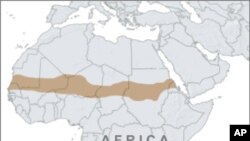The fight against hunger in the Sahel region continues as the World Food Program, WFP, and its partners are vigorously responding with humanitarian assistance to reach more than nine million people.
Consecutive droughts over the past three years have been ravaging the region, giving people no time to recover or grow food.
The WFP said it is responding with a focus on women and young people, especially small children because they are the most vulnerable. Aid agencies are working to make sure women and children get food in various countries, including Niger, Chad, Mali, Senegal, Burkina Faso, Mauritania, Cameron and the Gambia.
“Food prices are still abnormally high. Their savings are exhausted. The livestock herds haven’t been replenished. So the humanitarian needs are huge, and it is really important that we take action now,” said Bettina Luescher, WFP spokesperson in New York.
The organization, along with other humanitarian agencies have established various programs to help communities and businesses thrive under the critical conditions.
“We are doing cash for work programs, food for work programs, and irrigation programs, where we are paying them with food or vouchers,” said Luescher.
The food crisis was anticipated because of the ongoing drought, so the WFP and its partners have had at least six months to prepare.
“But we are also right now in the lean season,” said Luescher, “the season right before the harvest.”
She said people have eaten all of their reserves, and now they are waiting for the next harvest which is several months away.
The international community is also providing assistance to help the Sahel region. Just recently the United States Agency for International Development provided $56.9 million in additional funding to the WFP.
Consecutive droughts over the past three years have been ravaging the region, giving people no time to recover or grow food.
The WFP said it is responding with a focus on women and young people, especially small children because they are the most vulnerable. Aid agencies are working to make sure women and children get food in various countries, including Niger, Chad, Mali, Senegal, Burkina Faso, Mauritania, Cameron and the Gambia.
“Food prices are still abnormally high. Their savings are exhausted. The livestock herds haven’t been replenished. So the humanitarian needs are huge, and it is really important that we take action now,” said Bettina Luescher, WFP spokesperson in New York.
The organization, along with other humanitarian agencies have established various programs to help communities and businesses thrive under the critical conditions.
“We are doing cash for work programs, food for work programs, and irrigation programs, where we are paying them with food or vouchers,” said Luescher.
The food crisis was anticipated because of the ongoing drought, so the WFP and its partners have had at least six months to prepare.
“But we are also right now in the lean season,” said Luescher, “the season right before the harvest.”
She said people have eaten all of their reserves, and now they are waiting for the next harvest which is several months away.
The international community is also providing assistance to help the Sahel region. Just recently the United States Agency for International Development provided $56.9 million in additional funding to the WFP.





